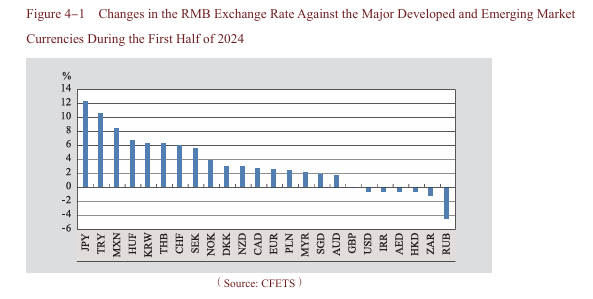China's Economic Resilience: Opportunities and Stability in a Volatile Global Market
In the first half of 2024, the global economy continued to grow, with inflationary pressures easing. However, differences in monetary policies among major developed economies led to fluctuations in international financial markets, while geopolitical risks escalated. Against this backdrop, China's economy maintained a steady trajectory, pursuing high - quality development and demonstrating remarkable resilience.
China's Balance of Payments: A Picture of Stability
China's foreign - exchange market showed strong resilience, with the RMB exchange rate maintaining basic stability at a reasonable and balanced level. Market expectations and transactions remained rational and orderly. The balance of payments continued to maintain an independent equilibrium pattern, with the current account recording a surplus of USD 93.7 billion, accounting for 1.1 percent of GDP and remaining within a reasonably balanced range.
Trade in Goods: The surplus in trade in goods remained stable, with the rebound in domestic and foreign demand contributing to growth in both exports and imports. This stability is a testament to the robustness of China's manufacturing sector and its ability to meet global demand.
Trade in Services: The deficit in trade in services increased, primarily due to the recovery of cross - border travel by domestic residents to normal levels. This trend reflects the growing consumer demand for international travel and services, which is expected to continue as the global travel industry recovers.
Non - Reserve Financial Account: The non - reserve financial account posted a deficit, forming an equilibrium pattern with the current account surplus. On one hand, diverse types of foreign investments in China amounted to USD 91.7 billion, a significant increase compared to the same period in 2022 and 2023. Direct equity investments maintained a net inflow, and net inflows of foreign portfolio investments in China were at a relatively high level compared to the past. On the other hand, China's outward investments totaled USD 218.9 billion, carried out in an orderly manner. Outward direct investments developed steadily, outward portfolio investments increased rapidly, and other outward investments, such as outward deposits and loans, remained basically stable.
By the end of June 2024, China's net external assets amounted to USD 3.0 trillion, an increase of 2.8 percent compared to the same period in 2023. This growth in net external assets highlights China's strong position in the global economy and its ability to manage cross - border capital flows effectively.

Implications for Global Businesses
For non - Chinese business professionals, China's economic performance and the stability of its balance of payments present significant opportunities. The current account surplus and the orderly management of outward investments create a favorable environment for foreign businesses looking to invest in China or establish partnerships with Chinese firms.
Investment Opportunities: The increase in foreign investments in China, particularly in direct equity and portfolio investments, indicates a growing interest from global investors. This trend is likely to continue as China's economy remains a key driver of global growth. For businesses in banking, investment companies, and large enterprise groups, this presents an opportunity to explore investment avenues in China, leveraging the country's stable economic environment and growing consumer market.
Cross - Border Capital Flows: The orderly management of outward investments by China suggests a stable and predictable environment for cross - border capital flows. For businesses involved in international finance and investment, this stability reduces the risk associated with investing in or partnering with Chinese firms. The increase in outward portfolio investments also indicates a growing sophistication in China's investment strategies, which could lead to more collaborative opportunities in global markets.
Policy Support: The Chinese government's commitment to deepening reforms and enhancing macroeconomic policy regulation provides a supportive environment for businesses. The Third Plenary Session of the 20th Central Committee of the Communist Party of China has made systematic arrangements for further comprehensive deepening of reforms, which will likely lead to more business - friendly policies and a more open investment environment.
Outlook for the Second Half of 2024
In the second half of 2024, the momentum for global economic growth may weaken, and monetary policies in major developed economies may enter a cycle of interest - rate cuts. The international financial environment is expected to improve, but the risk of fluctuations will still exist, and the international political situation will remain complex. China will continue to promote high - quality economic development, increase the intensity of macroeconomic policy regulation, and stabilize the internal foundation for the operation of the balance of payments.
Stable Current Account Surplus: It is expected that the current account surplus will remain at a reasonable and balanced level, providing a stable source of foreign - exchange earnings. This stability is crucial for businesses looking to engage in trade with China, as it ensures a predictable exchange rate environment and reduces currency risk.
Cross - Border Capital Flows: Cross - border capital flows are expected to gradually approach an equilibrium, which will further stabilize the foreign - exchange market. For businesses involved in international finance, this stability reduces the risk of sudden capital outflows and provides a more predictable environment for investment and trade.
Foreign - Exchange Reserves: The scale of foreign - exchange reserves is expected to remain stable, providing a strong buffer against external shocks. This stability is particularly important for businesses operating in volatile global markets, as it ensures that China can manage its external financial obligations effectively.
Conclusion
China's economic resilience and the stability of its balance of payments present significant opportunities for global businesses. The current account surplus, orderly management of outward investments, and the supportive policy environment create a favorable environment for foreign investment and trade. For non - Chinese business professionals, understanding these trends and leveraging the opportunities they present can lead to successful partnerships and investments in China.
As the global economic environment remains complex, China's commitment to high - quality development and macroeconomic stability provides a beacon of opportunity. Businesses that can navigate this environment and capitalize on China's economic strengths will be well - positioned for success in the global market.





















































First, please LoginComment After ~